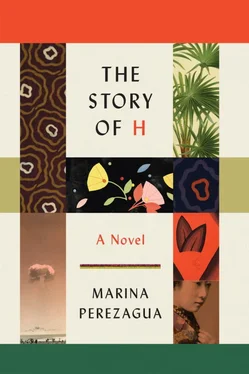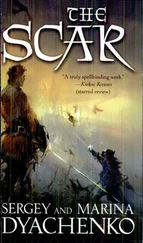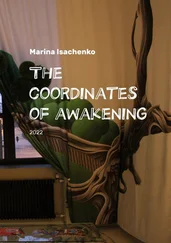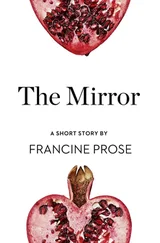You can tell me that I’m an old woman, that I’m not as sharp or as quick as a young person. And I would answer that you’re right, that today, a day when I’m writing my testimony, I’m very old, but since my mind had stopped for so many years and took a nice long nap, slept in its madness, it’s not as worn out as the minds of other people of my same age. Yours surely has never taken a nap in restorative insanity, because the crazy ones, when they do stop reasoning, also stop producing and fall away from the corrupt social mechanisms. I bet you’ve never wanted to allow your madness to snatch away your ambition. You are very sane. Oh, no doubt about it. You are very sane today, but when you reach my age you’ll wipe your drool with a hundred-dollar bill thinking it’s a rag.
Now tell me, how can it be that after so many years, European citizens, North American citizens, or citizens of any other country who grant themselves the right to defend human rights—with all their attendant sense of superiority when waving their flags—are able to watch the rebels or soldiers of the regular Congolese army, day in and day out, systematically massacre their girls and women? As you already know, sir, in Africa generally and in the Congo in particular, the family economy is built on women. Men don’t work. Women do everything. They are charged with fetching water, washing clothes in the river, finding food. The more fortunate are able to sell a few products gleaned from the earth, and whatever else the rebels allow. Four- and five-year-old girls prepare food for their brothers. When I arrived, I was surprised to find the men so idle, playing cards or sitting on the porches of their homes. So one day it occurred to me to ask one of these men why only women worked. He responded that men are warriors and they can’t work because they have to be ready for war at all times. I thought about it again when I heard an intelligent and very good woman say something, a woman I’ll call V for valiant to cloak her identity. In the Congo, V said, women have become a weapon of war. The rebels know everything depends on women, so they destroy them; they rape them so they can’t work for days. Some suffer so much they end up taking their own lives. They don’t have to bother killing the women themselves. Systematic rape is enough to ruin this country. So V then told a story to everyone who had come to that informative meeting to address the situation of Congolese women. There were twenty of us. Most were European. You already know the things I’ve seen and lived through. Well, believe me when I tell you that while listening to V tell her story, I confronted the truth about absolute cruelty for the first time. I felt the same shock, the same sense of disgust, the same impotence, the same desire to scream or to run nowhere and everywhere all at the same time. V told us the following story:
V had a friend, Jeanette, from her same hometown. The rebels kidnapped her together with her five children. They raped and tortured her for a week. At the end of the week, they gave her a room and nursed her back to health. They gave her water; they cured her wounds to the extent possible. They even fed her meat for several days. It had been a long time since Jeanette had eaten meat. Jeanette asked the soldiers why they were taking care of her after having hurt her and wanted to know if they would please let her see her five children. One of the rebels answered: “Now you say you want to see your five children? Now, after we’ve taken care of you for seven days? Now, after finally eating meat?”
V didn’t need any further clarification. She didn’t have to say it; all of us who had listened to her story understood what kind of meat Jeanette had been eating. One woman stood up and made her way through the chairs nearly crawling, wobbly. Outside of the little room we heard someone scream, “Please, someone call a doctor!” A boy had just passed out too. Obviously, no doctor ever came, and now that scream of the newly arrived white person seemed so bogus to me. A doctor to alleviate someone’s wounded sensitivity? Should he have warned V that her story wasn’t appropriate for the general public? No, not only did she not acknowledge it, she wasn’t the slightest bit ruffled by our expressions of horror, the scream of someone who surely had to wait for that moment to learn the nature of true pain. V kept still, her hands on the table, grave, looking each one of us in the eye, each and every one of us, and in a very poised tone of voice said, “ Je suis désolée. I don’t mean to wound you, but the Congo needs help.”
Despite what she wrote in her letter, Yoro never left the Congo, though she had changed mines. She went from mining coltan to mining gold at a site controlled by armed groups called Chondo. She was no longer there by the time I arrived, though something happened there that I’d never forget. Outside of the mine there was a man who weighed on a rudimentary scale the gold each miner extracted. He placed a match on one of the scale’s little plates, and on the other one, gold. For no reason, right before my eyes, they slit a woman’s throat and stole her tiny seed of metal, which passed from the scale to the hands of the man who had slaughtered her. It was the first time I’d ever seen someone’s throat being slit. I’ve often wondered if I’d ever experience it myself; if the circuit linking my eyes to my brain would still function for that last second to see and smell the same earth that would cover me, the ultimate freshness of the root tangling around my waist in a welcoming embrace into the nothing.
The Chondo mine was the third world’s bottomless pit. It was the seventh world. There couldn’t possibly be anything worse lower down. Though nowadays I believe there is always something deeper down, always something worse, substantial enough to sustain all the strata over a buried surface. I think I never actually saw the sturdy bedrock of hell, and yet how deep I went. When they took me to the Shinkolobwe mine in the Katanga region, the last mine that I would have to see, luckily, I stopped counting hells. It’s an endless descent, because in that descent is the journey to death, the journey of the restless wanderer.
You must have an idea already of what they extract in Shinkolobwe. Nobody had to explain it to me beforehand. You know why? Because the closer the jeep got to the mine, the more fragile the vegetation became—more and more frail, drier, yellower, deader and deader. Also the noises indicating the presence of animals grew fewer and fewer until there were none. Silence. Once there, only silence. There was a small artificial lake ahead, which the Belgians, pressured by the Americans, built to conceal what was below. But the dimensions of what lay below the lake were fabulously ambitious, and the mine never ceased its clandestine operation. The mineral was exported through Zambia. Most people said it was copper, others cobalt. Perhaps. But the most valuable resource there was uranium. Uranium, sir. Once again, oh yes, uranium. But what sets this mine apart from Rössing is that this uranium is not some garden-variety uranium. It’s the selfsame uranium that fed the bombs of Hiroshima and Nagasaki.
Life’s like that sometimes, isn’t it? Just when you think you’ve overcome what hurt you the most, you find yourself in a river whose current isn’t taking you to the outlet, but to where it’s born, forcing you to flow the course for a second time. That’s where I was, smack in the pit that exterminated my city. By day the mine didn’t seem to function, but large groups worked there by night extracting the uranium, whisking it out of the country illegally in trucks, passing customs at the border with rigged radioactivity detectors and moving through random controls for a few bucks in bribe money. The inanimate are the only ones with a right to life in this land. People kill each other, animals go extinct, vegetation burns, but the raw material of money abides. The continent of the human rights of the dollar. Human beings are no more than conduits, copper wires. Dollars won’t save your life, though if you’re alive they allow you to move. He who has money and is alive can move, money guarantees mobility, but not survival—that depends on chance. This took place in 2011. The second night in Shinkolobwe, in a tunnel whose ceiling filtered the radioactive water from the lake, I learned conclusively that Yoro had died. I had expected as much, don’t think I hadn’t already calculated that likelihood.
Читать дальше












